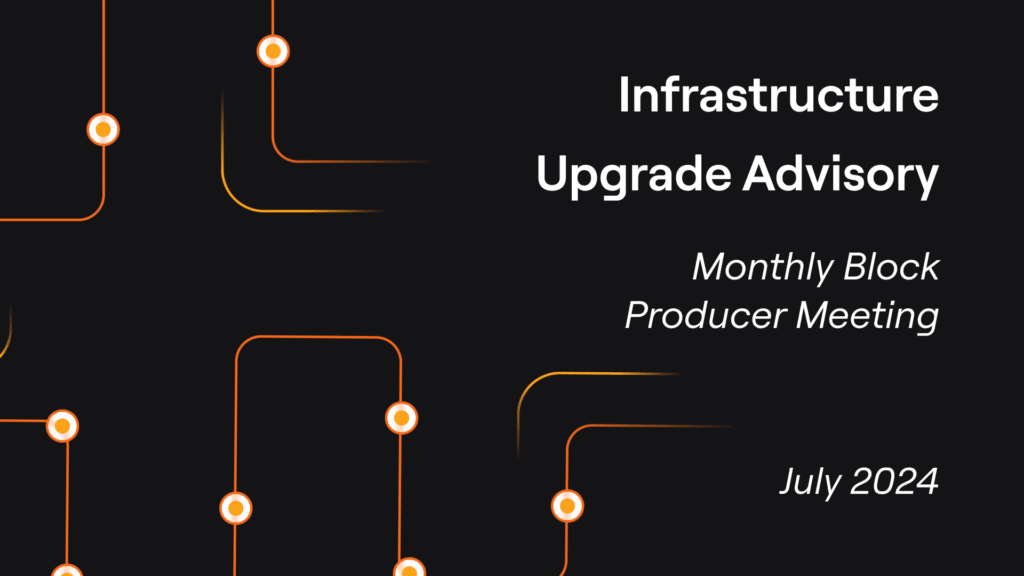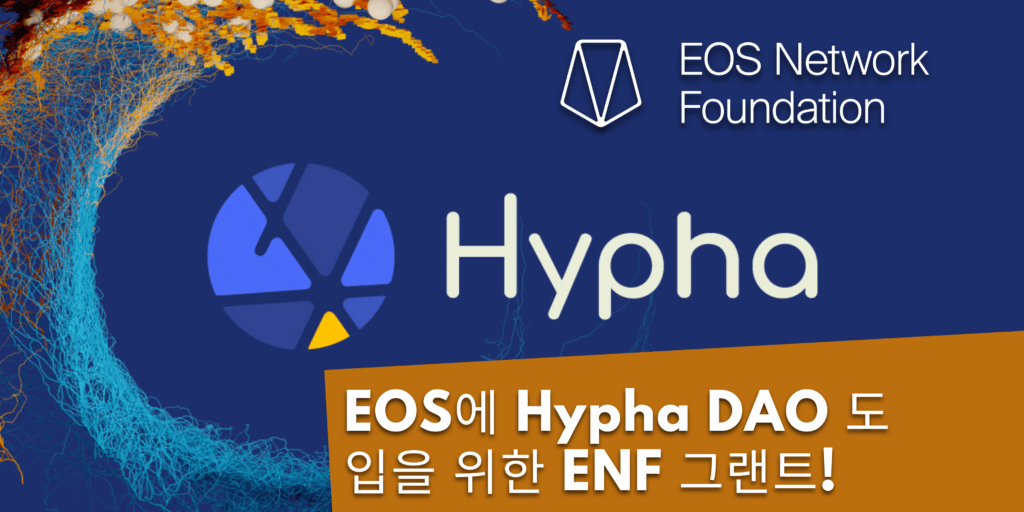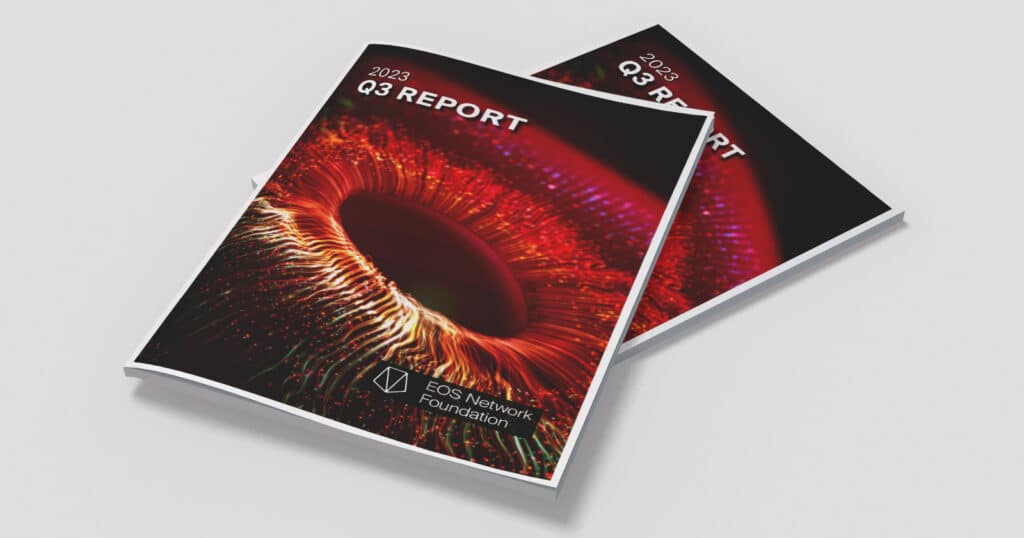Introduction
The monthly EOS Block Producer (BP) meetings foster regular communication among the top 30 EOS BPs, the EOS Network Foundation (ENF), EOS Labs, Middleware, and other key entities within the network. These meetings create a space for network operators and custodians to engage in open dialogue and work together for the continued development of the EOS ecosystem.
Meeting Overview
The meeting commenced at 1:00 UTC on September 5th, 2024, with the participation of 21 BPs and a total of 36 attendees. To support communication across different languages, the Interprefy tool was used to provide synchronous translation. Beatrice Wang, Communications Manager for ENF, opened the meeting by thanking the attendees for their ongoing commitment and presence.
The meeting was led by Yves La Rose, CEO and Founder of the EOS Network Foundation (ENF). Key topics discussed included:
- Infrastructure upgrades required for the exSat launch
- Details regarding the Spring 1.0 hard fork and its impact on network operations
- A review of exSat project milestones
- Updates on EOS Labs’ progress
- A comprehensive report on middleware efforts led by Greymass
- Next steps for block producers to prepare for upcoming changes
Infrastructure Upgrade Reminder
Yves La Rose provided a reminder to all BPs about the required infrastructure upgrades as part of the Spring 1.0 hard fork. He emphasized the importance of updating hardware to meet the new requirements:
- Block producers need a minimum of 256 GB RAM after the hard fork.
- Yves recommended using AWS instance types such as x2iezn.2xlarge for this upgrade: AWS instance recommendation.
Update on the Upcoming Spring 1.0 Hard Fork
ENF Project Manager, Brian Hazzard, followed with detailed information about the upcoming hard fork and key dates:
- The new Savanna consensus will reduce the time-to-finality to 1 second.
- Spring v1.0.0 will be available starting September 5, 2024.
- BPs must upgrade to Spring v1.0.0 prior to the EOS mainnet hard fork.
- Kylin testnet hard fork is scheduled for September 5, 2024, at 8:30 PM Eastern (successfully completed).
- EOS mainnet hard fork is set for September 25, 2024, at 9:00 AM Eastern.
- For further instructions, BPs can consult the upgrade guide: Spring 1.0 Upgrade Guide.
Huaqiang Wen: EOS Labs Update
Huaqiang Wen provided an update from EOS Labs, noting that the organization was founded one year ago and reflecting on how quickly time has passed. He mentioned that a one-year summary will be released after the exSat mainnet launch. Huaqiang highlighted that much of EOS Labs’ focus has been on exSat. He explained that research and development, as well as business development, for exSat is progressing rapidly, with an anticipated launch in late October 2024.
Aaron Cox: Greymass Middleware Efforts
Aaron Cox, Chief Brain at Greymass, provided his first update since the new tokenomics were passed, during which Greymass was entrusted with the middleware bucket. He explained that the Middleware team is focused on enhancing the user experience by expanding access to the network and simplifying interactions for users.
Key developments shared by Aaron include:
- A new Metamask integration using the “snaps” plugin architecture is in the final stages of approval. Once audited and approved, it will be distributed as part of Metamask’s official plugin catalog and be available for EOS users to use as a wallet.
- A new account creation system is in development to support network onboarding through Metamask and other integrating wallets and apps.
- A companion decentralized application (dApp) is being built to provide Metamask users a place to manage their accounts and interact with the EOS network. The team will leverage their experience with Unicove and the Wharf framework to offer a more modern, user-friendly interface. This platform will be open-source, encouraging collaboration from the broader EOS community and serving as an example of how modern dApps can be built.
Aaron emphasized that while the team initially had ambitious goals to release these products by the hard fork, the actual releases will take place afterwards in Q4. He concluded by inviting any questions and offering to provide more detailed updates in the near future.
Tony: exSat Project Milestones
Tony provided a detailed review of the milestones achieved by the exSat project, emphasizing the collaborative effort that has driven the project’s rapid development from January through the present.
- January 02, 2024:
Tony opened by recalling the “magical moment” when the proposal to embrace the BTC ecosystem and transform EOS into a Bitcoin Layer 2 solution (BTCL2) was made. This proposal marked the starting point for exSat, sparking initial discussions within the BP chat group. - January 11, 2024:
During the first BP meeting, Tony presented a document outlining the vision for EOS as BTCL2. This in-depth discussion led to the formation of the SEAL-Volunteer Team, a group of motivated individuals who would drive the project forward by brainstorming and actively exploring the EOS-BTC ecosystem. - January 22, 2024:
The official EOS-BTCL2 project launch plan was released. By the second BP meeting on January 29, the proposal had been accepted by the community, marking the official start of the project. Tony emphasized how quickly the team moved from ideation to execution, setting the stage for future milestones. - January 30, 2024:
The project name “exSat” and token name “xSat” were finalized through community consensus. Tony described this phase as one of intense brainstorming and reflection on how exSat could differentiate itself from other BTC projects. The decision was made to focus on scaling Bitcoin’s consensus through the exSat Docking Layer, an infrastructure aimed at expanding BTC’s reach. - February – March 2024:
Over the following months, multiple rounds of discussions led to the finalization of the exSat product architecture. Tony noted that the team was committed to creating an innovative solution that would not fall into the trap of being just another homogeneous BTC project. The exSat Docking Layer, designed to scale Bitcoin consensus, emerged as a key differentiator. - March – April 2024:
The team then focused on writing the exSat whitepaper, building the R&D and business structures, and preparing for public launch. The whitepaper debuted at the Hong Kong BTCL2 conference, where Yves La Rose delivered a keynote speech. The official website was launched alongside this announcement, marking the project’s public debut. - April 10 – May 05, 2024:
Tony shared that exSat made its first public appearance as a sponsor at the Hong Kong Asia Bitcoin Congress, where it attracted attention from major industry players and media outlets such as Forbes. During this time, the team also continued to refine the product’s design and framework while deepening business development efforts. - May – July 24, 2024:
The testnet was successfully developed and launched, with significant support from business development efforts. Tony proudly announced that exSat secured cooperation from mining pools representing over 40% of BTC’s hash power, as well as agreements with 21 validation nodes (each staking 100BTC). He highlighted the speed at which the project moved from concept to functioning testnet, noting how rapidly exSat was gaining industry recognition. - July 25 – July 27, 2024:
exSat debuted at the Bitcoin 2024 conference in Nashville, where it served as a 3 Block Sponsor. Tony described the event as a “fabulous success” that helped further raise exSat’s profile. The testnet was launched during the conference, marking a major milestone in the project’s timeline and setting the stage for the full mainnet launch. - August – September 2024:
As debugging continued on the testnet, Tony noted that business development efforts were also ramping up, with more mining pools and institutional nodes joining the network. The focus now shifted to ensuring a smooth onboarding process for mainnet partners and preparing the infrastructure needed for a successful launch. - September 25, 2024:
Tony highlighted the final preparations for the mainnet launch, which will take place after the Antelope Spring 1.0 hard fork. He stressed the importance of this phase for ensuring that exSat is secure, stable, and fully functional. The team remains focused on the critical tasks of final debugging, software auditing, and working closely with partners. - September 26 – October 25, 2024:
The team will work to synchronize the 840,000 BTC blocks leading up to the Bitcoin halving and conduct external audits of all smart contracts. Tony emphasized the importance of solidifying partnerships with mining pools and validator nodes to ensure a decentralized and robust exSat network. These steps will help position exSat as a reliable and trusted infrastructure in the Bitcoin ecosystem. - October 23, 2024:
Tony concluded his talk by revealing a date in late October had been selected as the official date for the exSat mainnet launch. He noted that this date had been chosen for its auspicious nature. He expressed excitement about the potential for exponential growth following the mainnet launch and reiterated his confidence in exSat’s ability to shape the future of the Bitcoin ecosystem.
Tony concluded his talk by revealing that October 23 had been selected as the official date for the exSat mainnet launch. He noted that this date had been chosen for its auspicious nature. He expressed excitement about the potential for exponential growth following the mainnet launch and reiterated his confidence in exSat’s ability to shape the future of the Bitcoin ecosystem.
Block Producer Attendee List
- Big.ONE
- Blockpool
- Defibox
- Detroit Ledger Technologies
- EOS Asia
- EOS Lambda
- EOS LaoMao
- EOS More
- EOS Nation
- EOS Rio
- EOS Seoul
- EOS Sphere
- EOS Support
- EOS USA
- EOSflytoMARS
- EOSIO.SG
- GenerEOS
- Greymass
- PIZZA
- Slowmist
- StartEOS
EOS Network
The EOS Network is a 3rd generation blockchain platform powered by the EOS VM, a low-latency, highly performant, and extensible WebAssembly engine for deterministic execution of near feeless transactions. It is purpose-built for enabling optimal Web3 user and developer experiences. EOS stands as the flagship blockchain and financial center of the Antelope framework, facilitating public goods funding for tools and infrastructure through the EOS Network Foundation (ENF).
EOS EVM
The EOS EVM is an emulation of the Ethereum EVM, housed within an EOS smart contract. It offers feature parity to other EVMs in the space but with unmatched speed, performance and compatibility. EOS EVM connects the EOS ecosystem to the Ethereum ecosystem by allowing developers to deploy a wide array of Solidity-based digital assets and innovative dApps on EOS. Developers can use EOS EVM to take advantage of Ethereum’s battle-tested open source code, tooling, libraries and SDKs, while leveraging the superior performance of EOS.
EOS Network Foundation
The EOS Network Foundation (ENF) was forged through a vision for a prosperous and decentralized future. Through our key stakeholder engagement, community programs, ecosystem funding, and support of an open technology ecosystem, the ENF is transforming Web3. Founded in 2021, the ENF is the hub for EOS Network, a leading open source platform with a suite of stable frameworks, tools, and libraries for blockchain deployments. Together, we are bringing innovations that our community builds and are committed to a stronger future for all.



